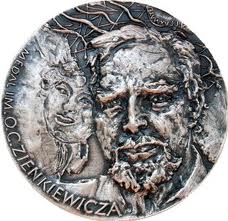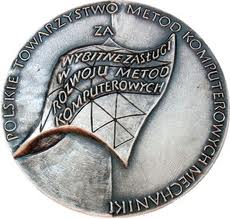Medal PTMKM im. prof. O.C. Zienkiewicza
Z inicjatywy PTMKM został ustanowiony Medal Polskiego Towarzystwa Metod Komputerowych im. O.C. Zienkiewicza. Jest on przyznawany za wybitne zasługi w rozwoju metod komputerowych mechaniki.


Do medalu dołączony jest tekst w j. angielskim:
Olgierd Cecil Zienkiewicz Medal
The medal edited by Polish Association for Computational Mechanics is awarded by the Chapter for outstanding merit in the development of computational mechanics.
The obverse of the medal – a dynamic composition of Prof Zienkiewicz’s portrait with a graphic suggestion of his ideas and his Wife in the background.
Turning the medal over round its horizontal axis illustrates Prof. Zienkiewicz’s revolutionary method.
The reverse of the medal – the marked vertical diameter forms a kind of “a mobile flywheel” – development – verbalized by the inscription: Polish Association for Computational Mechanics for the outstanding merit in the development of computational mechanics which expresses the efforts of innovative quest.
The Author: Anna Praxmayer
The date of origin: 2007
A reversible medal signed on the obverse made of brass, covered with silver, patinated.
Edition: 100 pieces plus 10
Diameter: 70 mm.
Ustanowiono trzy kategorie Medalu:
- medal za "całokształt działalności";
- medal za wybitne osiągnięcia w okresie ostatnich 2 lat;
- medal dla uczonych zagranicznych, szczególnie zasłużonych dla rozwoju metod komputerowych w Polsce.
Medal jest przyznawany uchwałą Zarządu Polskiego Towarzystwa Metod Komputerowych Mechaniki na wniosek Kapituły Medalu osobom fizycznym, zaś w wyjątkowo uzasadnionych sytuacjach instytucjom, stowarzyszeniom lub organizacjom o profilu działania związanym z metodami komputerowymi mechaniki.
Medale mogą być przyznawane co dwa lata podczas konferencji CMM, w liczbie nie większej niż 2 w każdej z trzech kategorii, przy czym wyjątkowo w pierwszym roku (2007) liczba ta może być podwojona.
Pierwsze przyznanie Medalu PTMKM (w roku 2007) nastąpiło wyjątkowo na podstawie tymczasowego Regulaminu przygotowanego i uchwalonego przez Zarząd PTMKM.
Wnioski o odznaczenie Medalem PTMKM we wszystkich trzech kategoriach mogą być składane przez:
- grupę minimum 10 członków PTMKM;
- Zarząd Towarzystwa.
Wnioski przesyłane do Zarządu PTMKM muszą zawierać szczegółowe uzasadnienie oraz być osobiście podpisane przez wnioskodawców. W wyjątkowych przypadkach możliwe jest przysłanie podpisanego wniosku faksem +48 61 876-6116.
Wnioski należy przesyłać na adres:
Zarząd Polskiego Towarzystwa Metod Komputerowych Mechaniki
61-138 Poznań, ul. Piotrowo 5
tel.: (61) 665-2454, 665-2457, fax: (61) 876-6116, 665-2059,
E-mail: [email protected]
List prof. O.C. Zienkiewicza do przewodniczącego PTMKM prof. T. Burczyńskiego
16 June 2007
Professor Tadeusz Burczyński President Polish Association for Computational Mechanics Silesian University of Technology Department for Strength of Materials and Computational Mechanics ul.Konarskiego 18A/102 44-100 Gliwice Poland
Dear Professor Burczyński,
Please accept my most sincere thanks for honouring me by naming your most senior medal of computational mechanics in my name.This is a particular honour to me in view of my father’s origin in Poland and my own high school education in Katowice.
The work you must have put in choosing the artist has now paid-off and I am most impressed with the sculpture on which the medal is based. Indeed a friend who was visiting us on the day of the arrival of your letter remarked on the extremely good way in which my resemblance was captured and indeed I am very much impressed by the whole outline of the sculpture and wait with impatience to hear the explanations of the artist to whom I think you should present my compliments.
As I am the honorary chairman of your congress I know I should be present to present the first awards of this medal. However, I have difficulties in travelling. For this reason I have to be absent.I am extremely impressed with the choice you have made for the first awards of the medal.The choice of the three Polish recipients is most interesting to me. Professor Szmelter was certainly one of the first who initiated the idea of finite elements in a very simple form of minimising the potential energy for the assembly of rectangles. Of course he did not realise its complete potential which was later developed but this early work certainly presents in a very clear way the whole idea on which the development of finite element is based. It is sad that the award has to be made posthumously but Joanna, his daughter, will be there to receive it.She herself is a finite element specialist. We have always kept contact.Please congratulate her for her father’s well deserved medal.
The other two Polish recipients are well known to me. The first of these two, Prof M Kleiber is an old friend as we have collaborated and exchanged views for many years. Certainly his administrative responsibilities at the Academy Institute place him in a very eminent position from which he can be most effective in sponsoring computational mechanics. Further his recent promotion to the full presidency of the academy strengthens his position immensely.Moreover he is known for his scientific contributions and the numerous books he has published in the field. The ideas of stochastic finite elements are almost entirely due to his work.Prof Z.Kaczkowski is known to me for his numerical contributions. He is certainly a distinguished researcher who has contributed very much to the subject of mechanics and his name is widely celebrated in the field.
The three recipients who come from outside Poland are all known to me personally.Prof Mang is an old friend and I also know him through the activities of IACM where he has presided for some years.The congress he ran in Vienna is still a model of perfection and much envied by others. Prof G Maier has certainly done very much in directing the studies at his department in Milano to computational fields for which he is well known. He certainly contributed to an immense amount to dynamic problems of earthquake engineering and also such problems as fatigue, the repetitive failure, which often occurs in reality.Prof T.Oden will I understand not be present at your congress but will have to wait for the personal visit by Prof Burczyński to the USA. I know him well and have been impressed by his work since the late sixties when he published work on large deformation. This remains in the literature as a landmark which to the present day is frequently referenced.His work both for IACM and in general the computational field is appreciated by all.I know that I also will be a recipient of the medal and I am delighted that this will be presented to me by Prof Burczyński, in Swansea in the near future.
I know the congress is going to be a great success as indeed it was in the previous years.I didn’t realise that it was already its 17thoccasion but time flies. May I wish you all the very best for continuing activities in the future.It will unite those working in Poland and elsewhere in this field.My best wishes for your conference which I am sorry to miss.
O.C.Zienkiewicz
